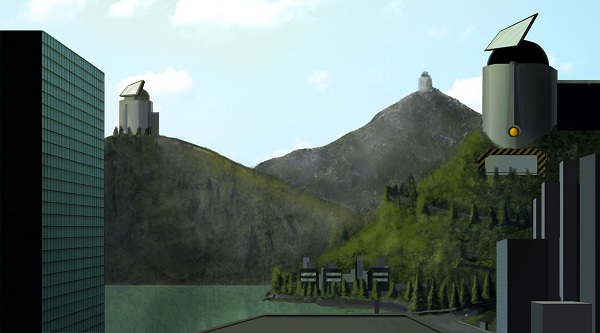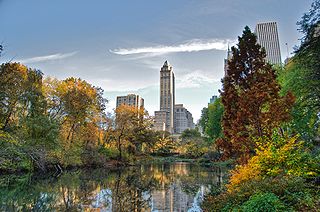Urban Futures: Beyond Concrete Towers
Illustrated by DEREK BOGDAN
The following article was written for the Transforming Futures exhibition, taking place in late March, early April 2012 in the Warren G. Flowers gallery at Dawson College. The exhibition explores the future as a place of unbound invention and extraordinary possibility.
 When you think of the future, what comes to mind? Hovercrafts? The latest technology in zombie protection? As farfetched, apocalyptic or utopic as some of our ideas about the future may seem, they serve a purpose: they remind us that what seems normal to us today can give way to a new normal tomorrow, whether in two weeks or two centuries. They also invite us to wonder how new technologies and changes in the way we live may also alter the ways we relate to one another in society.
When you think of the future, what comes to mind? Hovercrafts? The latest technology in zombie protection? As farfetched, apocalyptic or utopic as some of our ideas about the future may seem, they serve a purpose: they remind us that what seems normal to us today can give way to a new normal tomorrow, whether in two weeks or two centuries. They also invite us to wonder how new technologies and changes in the way we live may also alter the ways we relate to one another in society.
Imagine, then, let’s say, a city of the future. Today, you leave your house or apartment and cross streets through the concrete jungle on your way to your job or an appointment. But what if tomorrow you lived in a huge inner-city mall-like community where your dentist’s office was right next to your grocer, one floor above your apartment––a new city design offering protection from the smog and pollution that plagues modern urban life? Would mall-like cities, if plausible, be desirable? How might they re-define our interactions and relationships with each other? Mall-like cities would bring people to into even closer and more constant contact with each other; would this new arrangement bond society even more strongly together or drive its members further apart?
On the other hand, what if tomorrow’s cities were less centralized, even to the point of not being “cities” anymore? Think of cities such as New York, Tokyo, Paris and Dubai. Today, they contain the cultural, political and economic engines that drive our civilization––many of the best arts scenes, universities, museums, shopping areas, and most important economic and political institutions in the world. But what if the notion of a kind of “anti-city” or de-centralized city took hold, as a preferable alternative to having all our important institutions in one place? What if the engines of our civilization were spread around to less populated areas? What if suburbia, smaller towns, even farm land became the new homes for these institutions? How might such a shift affect our civilization? Would we define culture, economics and education the same way as we do now, or would the change of scenery and atmosphere force us to re-conceptualize the notions of society and civilization we’ve lived with and believed in for so long?
 Today, green spaces like New York’s Central Park and Montreal’s Mount Royal Park (both designed by the American landscape architect Frederick Law Olmstead) are essential to the successful meshing of concrete and nature in city spaces. And every year Montreal and other cities hold a “car-free” day by cordoning off a section of their downtown, making it inaccessible to traffic. What if cities went further and banned cars altogether? What if public transportation became the only way to get around a city? Would there be a ripple effect beyond the cities, with everyone turning to high-speed rail and other modes of public transportation, eventually making cars obsolete? Could such a scenario even become necessary if we run out of fossil fuels, or if we suddenly find ourselves with no other alternative but to reduce or eliminate our gas emissions altogether? Green spaces are a vital characteristic of cities: artists and musicians alike make their crafts accessible in public parks; lovers walk their paths and gardens; children race their miniature boats on their man made ponds; and joggers train for marathons on the city’s running tracks. How would a far more dramatic expansion of green spaces affect city life?
Today, green spaces like New York’s Central Park and Montreal’s Mount Royal Park (both designed by the American landscape architect Frederick Law Olmstead) are essential to the successful meshing of concrete and nature in city spaces. And every year Montreal and other cities hold a “car-free” day by cordoning off a section of their downtown, making it inaccessible to traffic. What if cities went further and banned cars altogether? What if public transportation became the only way to get around a city? Would there be a ripple effect beyond the cities, with everyone turning to high-speed rail and other modes of public transportation, eventually making cars obsolete? Could such a scenario even become necessary if we run out of fossil fuels, or if we suddenly find ourselves with no other alternative but to reduce or eliminate our gas emissions altogether? Green spaces are a vital characteristic of cities: artists and musicians alike make their crafts accessible in public parks; lovers walk their paths and gardens; children race their miniature boats on their man made ponds; and joggers train for marathons on the city’s running tracks. How would a far more dramatic expansion of green spaces affect city life?
What about underground cities? If there’s no room above the earth, perhaps developers might building below the earth. Montreal is a great example; we have the largest underground network in the world! Now, granted, it is mostly commercial, but what if these subterranean cities became residential? Cities like Berlin and Chicago have extensive secret passages under their city streets; how might society change if we moved underground in the future (besides the fact that we would need to take a lot more Vitamin D)? Such a move might seem like a radical notion, but if developers are looking for more ways to fit our ever-growing population into cities, drastic changes to the way we live may need to be made, with potentially drastic affects on our society. A city is not just a backdrop for society’s activities; it is integral to and indeed shaping of them.
It seems likely that society in the coming years will continue to adhere to our current notion of the “city,” where most of the mechanisms of our civilization are gathered in one place, but we can’t predict today all the challenges we may face in the future––environmentally, economically, politically––or what changes we may need to consider to meet those challenges, or what effects such changes may impose on us as a society. Therefore, when we consider the future, we should let our minds run wild. Every alternative to our current way of organizing society, and the social consequences of those alternatives, should be thought of, discussed, and even perhaps put to test.
Thinking outside the city-box isn’t only essential; it may be the key to our survival as we confront the problems that have arisen from the massive urbanization that has defined our society these past two centuries. We may need to grow, first in our imaginations and then in reality, beyond the concrete towers of the city.

Comments
Charaf Laroussi
March 13, 2012Very interesting article! You have written on a very innovative subject with interesting ideas. Personally, I would find it really sad to live in an underground or mall-like city… I think that we should go back to the ancient city organization, like Rome or Athens actually has. They were built many years ago and they are still beautiful places to live-in (Many more recent cities based their building organization on them). I cannot imagine us destroying places like New-York or Paris to transform them into mall-like cities! However, the idea of the less centralized cities makes more sense for me. I think that, because of globalization, the new global tendency is now the decentralization of economy. A country where the institutions are spread around the whole territory and not only in the capital is very likely to exist in the future, in my opinion.
Corey Price
November 8, 2012I think that no matter what happens with future cities, we need to consider the effects on our environment. Can an inner city mall like community sustain itself? Or even sustain itself without severely damaging our planet? Sustainability is really the biggest factor in determining what our future should look like. Humans have necessities like food and water. Many North American cities take for granted things like our access to clean drinkable water.
I would like to see future cities with more nature. We should try to grow vegetables and plant more trees where we can. Many are already doing so. I have a love for nature that i share with many other people and i think that if cities were to lose what little amount of nature is already there, then future generations will not respect the environment as much as they should.
You have to be registered and logged in in order to post comments!